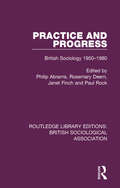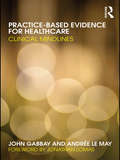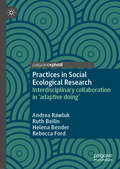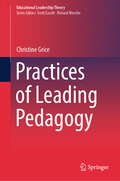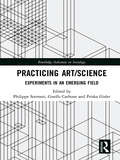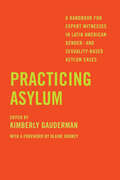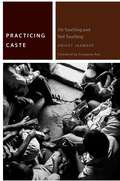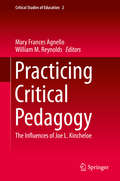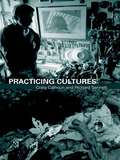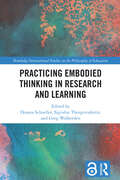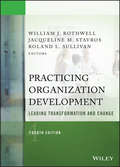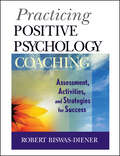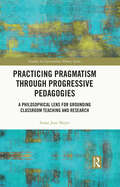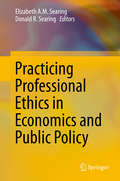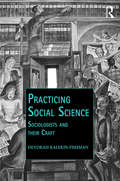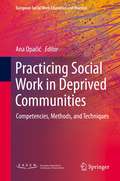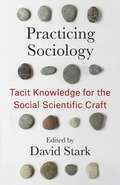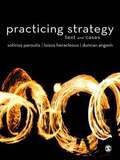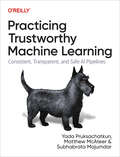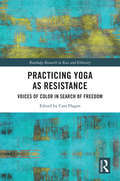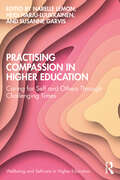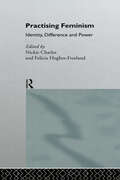- Table View
- List View
Practice and Progress: British Sociology 1950-1980 (Routledge Library Editions: British Sociological Association #1)
by Philip Abrams, Rosemary Deem, Janet Finch and Paul RockOriginally published in 1981 Practice and Progress is a collection examining the changes that have occurred in the theories, methodologies and practices of sociology, in the institutional and educational setting of the subject, and in British society. The themes pursued include the professionalization of sociology its development and standing in the universities; the impact on it of Marxism and feminism and the major debates over positivism and empiricism, quantitative methods, linguistic analysis; and numerous other crucial methodological and theoretical concerns.
Practice-based Evidence for Healthcare: Clinical Mindlines
by John Gabbay Andrée le MayThis book challenges the evidence-based practice movement to re-think its assumptions. Firmly rooted in real practice while drawing lucidly on a great breadth of theoretical frameworks, it examines afresh how clinicians use knowledge. Evidence-based practice has recently become a key part of the training of all health professionals. Yet despite its ‘gold-standard’ status, it is faltering because too much effort has gone into insisting on an idealised model of how clinicians ought to use the best evidence, while not enough has been done to understand why they so often don’t. Practice-based Evidence for Healthcare is a groundbreaking attempt to redress that imbalance. Examining how clinicians actually develop and use clinical knowledge day-to-day, the authors conclude that they use ‘mindlines’– internalised, collectively reinforced, tacit guidelines. Mindlines embody the composite and flexible knowledge that clinicians need in practice. They are built up during training and continually updated from a wide range of formal and informal sources. Before new evidence becomes part of practitioners’ mindlines, it is transformed by their interactions with colleagues and patients via their communities of practice and networks of trusted colleagues. To explore how mindlines work Gabbay and le May draw on a wide range of disciplines to analyse their detailed observations of clinical practice in the UK and the US. Their conclusions and provocative recommendations will be of value to all practitioners, health service managers, policymakers, researchers, educators and students involved in the promotion of evidence-based practice.
Practices in Social Ecological Research: Interdisciplinary collaboration in 'adaptive doing'
by Helena Bender Andrea Rawluk Ruth Beilin Rebecca FordAimed at those at the forefront of social ecological thinking, this book presents a practice-oriented process to navigate the complex, interdisciplinary challenges of our time. The book brings together insights from the social sciences and beyond to introduce readers to ‘adaptive doing’ - a continuous and iterative process of experiential learning that provides an accessible structure and process for integrating a range of knowledge and practices. As part of the ‘adaptive doing’ learning cycle, the authors argue for a common platform, symbolically called ‘the agora’, where multiple ways of understanding can be discussed. In this space, participants can work from practice and narratives, toward meaning, knowledge formation and practice change.The book demonstrates three reframing tools for social ecological practice that provide readers with multiple ways of holistically entering the social ecological domain and expanding their perspectives with a view to changing practice. ‘Adaptive doing’ is presented as a catalyst for a new generation of social ecological research, in which participants honour their disciplinary foundations while being ready to collaborate within each new system, and each new engagement: being able to act now, for social ecological recognition and change.
Practices of Leading Pedagogy (Educational Leadership Theory)
by Christine GriceThis book examines the intersection between pedagogy and leadership in intersubjective spaces. The intention is to discover answers to the most important question of educational leadership theory for practice today: who leads learning? This book addresses current misconceptions about pedagogical leadership and pedagogy in schools today. It explores the evolution of pedagogy and pedagogical leadership over time from a philosophical perspective. This book advocates for a return to philosophical thinking about learning and leading the child over teaching and skills, while also reducing the binary between these fields. Each chapter draws upon empirical research, alongside theory and philosophy. This book addresses key provocations about pedagogy and pedagogical leadership found in policy and professional learning that influence understandings that educational leaders have about the meaning of pedagogy and pedagogical leadership with implications for leading pedagogy in schools today.
Practicing Art/Science: Experiments in an Emerging Field (Routledge Advances in Sociology)
by Philippe Sormani Guelfo Carbone Priska GislerOver the last two decades, multiple initiatives of transdisciplinary collaboration across art, science, and technology have seen the light of day. Why, by whom, and under what circumstances are such initiatives promoted? What does their experimental character look like - and what can be learned, epistemologically and institutionally, from probing the multiple practices of "art/science" at work? In answer to the questions raised, Practicing Art/Science contrasts topical positions and insightful case studies, ranging from the detailed investigation of "art at the nanoscale" to the material analysis of Leonardo’s Mona Lisa and its cracked smile. In so doing, this volume brings to bear the "practice turn" in science and technology studies on the empirical investigation of multifaceted experimentation across contemporary art, science, and technology in situ. Against the background of current discourse on "artistic research," the introduction not only explains the particular relevance of the "practice turn" in STS to tackle the interdisciplinary task at hand, but offers also a timely survey of varying strands of artistic experimentation. In bringing together ground-breaking studies from internationally renowned scholars and upcoming researchers in sociology, art theory and artistic practice, as well as history and philosophy of science, Practicing Art/Science will be essential reading for practitioners and professionals in said fields, as well as postgraduate students and representatives of higher education and research policy more broadly.
Practicing Asylum: A Handbook for Expert Witnesses in Latin American Gender- and Sexuality-Based Asylum Cases
by Kimberly GaudermanA free ebook version of this title is available through Luminos, University of California Press's Open Access publishing program. Visit www.luminosoa.org to learn more. This multidisciplinary volume brings together experienced expert witnesses and immigration attorneys to highlight best practices and strategies for giving expert testimony in asylum cases. As the scale and severity of violence in Latin America has grown in the last decade, scholars and attorneys have collaborated to defend the rights of immigrant women, children, and LGBTQ+ persons who are threatened by gender-based, sexual, and gang violence in their home countries. Researchers in anthropology, history, political science, and sociology have regularly supported the work of immigration lawyers and contributed to public debates on immigration reform, but the academy contains untapped scholarly expertise that, guided by the resources provided in this handbook, can aid asylum seekers and refugees and promote the fair adjudication of asylum claims in US courts. As the recent refugee crisis of immigrant mothers and children and unaccompanied minors has made clear, there is an urgent need for academics to work with other professionals to build a legal framework and national network that can respond effectively to this human rights crisis.
Practicing Caste: On Touching and Not Touching (Commonalities)
by Aniket JaawarePracticing Caste attempts a fundamental break from the tradition of caste studies, showing the limits of the historical, sociological, political, and moral categories through which it has usually been discussed. Engaging with the resources phenomenology, structuralism, and poststructuralism offer to our thinking of the body, Jaaware helps to illuminate the ethical relations that caste entails, especially around its injunctions concerning touching. The resulting insights offer new ways of thinking about sociality that are pertinent not only to India but also to thinking the common on a planetary basis.
Practicing Cooperation: Mutual Aid beyond Capitalism (Diverse Economies and Livable Worlds)
by Andrew ZitcerA powerful new understanding of cooperation as an antidote to alienation and inequality From the crises of racial inequity and capitalism that inspired the Black Lives Matter movement and the Green New Deal to the coronavirus pandemic, stories of mutual aid have shown that, though cooperation is variegated and ever changing, it is also a form of economic solidarity that can help weather contemporary social and economic crises. Addressing this theme, Practicing Cooperation delivers a trenchant and timely argument that the way to a more just and equitable society lies in the widespread adoption of cooperative practices. But what renders cooperation ethical, effective, and sustainable?Providing a new conceptual framework for cooperation as a form of social practice, Practicing Cooperation describes and critiques three U.S.-based cooperatives: a pair of co-op grocers in Philadelphia, each adjusting to recent growth and renewal; a federation of two hundred low-cost community acupuncture clinics throughout the United States, banded together as a cooperative of practitioners and patients; and a collectively managed Philadelphia experimental dance company, founded in the early 1990s and still going strong. Through these case studies, Andrew Zitcer illuminates the range of activities that make contemporary cooperatives successful: dedicated practitioners, a commitment to inclusion, and ongoing critical reflection. In so doing he asserts that economic and social cooperation must be examined, critiqued, and implemented on multiple scales if it is to combat the pervasiveness of competitive individualism.Practicing Cooperation is grounded in the voices of practitioners and the result is a clear-eyed look at the lived experience of cooperators from different parts of the economy and a guidebook for people on the potential of this way of life for the pursuit of justice and fairness.
Practicing Critical Pedagogy
by William M. Reynolds Mary Frances AgnelloThis edited text recaptures many of Joe L. Kincheloe's national and international influences. An advocate and a scholar in the social, historical, and philosophical foundations of education, he dedicated his professional life to his vision of critical pedagogy. The authors in this volume found mentorship, as well as kinship, in Joe and express the many ways in which he and his work made profound differences in their work and lives. Joe's research always pushed the limits of what critically reflective and informed teaching entailed, never diluting the import of comprehending the complexity of sociopolitical, cultural, economic, and educational discourses and practices. Dedicated to a praxis of social and political activism rooted in students' development as citizens and workers, the labor of teachers as action researchers, cultural workers, and social mediators is always at the heart of all he achieved. We who were so influenced directly and indirectly by him knew his genius and relished the generosity with which he shared his ideas, advice, encouragement, and art. The world is better because of Joe L. Kincheloe scholarship--inextricably related to "critical" critical thinking and enactment of education that tenaciously interrupts complacency, mediocrity, always responding thoughtfully to particular educational contexts.
Practicing Culture (Taking Culture Seriously)
by Craig Calhoun Richard SennettPracticing Culture seeks to revitalize the field of cultural sociology with an emphasis not on abstract theoretical debates but on showing how to put theoretical sources to work in empirical research. Culture is not just products and representations but practices. It is made and remade in countless small ways and occasional bursts of innovation. It is something people do – and do in rich variety and distinctive contexts as engaging case studies from the book reveal. For example: in Russia’s most Western city, Kaliningrad, residents dig for artifacts symbolizing a German past – even though their parents only migrated to what was once Konigsberg after WWII in the USA, fans of professional wrestling pride themselves on being smart enough to know how much is trickery and how the tricks work yet still believe in the contest. Practicing Culture will reshape and invigorate the sociology of culture, not only through internal development, but through enhanced connections to the interdisciplinary social theory and to related fields like the sociology of knowledge and ethnography. It will prove an essential tool for students and researchers of cultural theory, contemporary social theory and cultural sociology.
Practicing Embodied Thinking in Research and Learning (Routledge International Studies in the Philosophy of Education)
by Sigridur Thorgeirsdottir Donata Schoeller Greg WalkerdenThis book delves into the embodied ground of thinking, illuminating the transition from theorising about the embodied mind to actively practising embodied thinking in research, teaching, and learning. The authors speak from immersing themselves in novel methods that engage the felt, experiential dimensions of cognition in inquiry.The turn to embodiment has sparked the development of new methodologies within phenomenology, pragmatism, and cognitive science. Drawing on Eugene Gendlin’s philosophical work on felt understanding, and Francesco Varela’s enactivist approach, contributors explore innovative embodied thinking methods such as Focusing, Thinking at the Edge, micro-phenomenology, and mindfulness practices. They demonstrate the practical applications of these methods in research, teaching, and learning, highlighting their liberating and empowering potential for researchers and students. In an age marked by information overload and societal polarisation, methods of embodied thinking provide an innovative edge to critique, complementing more traditional approaches to critical thinking with listening skills and reflexive care.This book shows how heeding the essential, yet often overlooked, embodied grounds of critical and creative thinking can deepen and strengthen each of research, teaching, and learning. It will interest philosophers of education and educators in higher education in particular, as well as researchers and postgraduate students from philosophy, and the cognitive and social sciences, who are curious about how embodied thinking can enrich research, teaching, and learning.
Practicing Organization Development
by William J. Rothwell Roland L. Sullivan Jackie StavrosGet on the cutting edge of organization development Practicing Organization Development: Leading Transformation and Change, Fourth Edition is your newly revised guide to successful organization development. This edition has been updated to explore the cutting edge of change management, leadership development, organizational transformation, and society benefit. These concepts are explored through emerging and increasingly accepted strengths-based approaches such as: appreciative inquiry, emotionally and socially intelligent leadership, positive organization development, and sustainable enterprises. This edition offers both theoretical concepts and guides to practical applications, providing you with the knowledge, techniques, and tools to put organizational development to effective use in the workplace. Organization development is an evolving field focused on understanding and positively impacting the human system processes of groups, teams, organizations, and individual leaders. Thorough organization development results in increased effectiveness, improved health, and overall success. This book shows how to attain positive change by: identifying contemporary themes in organization development, executing organization development approaches, as well as elevating and extending research agenda. This book also illustrates how to influence organizational stakeholders, and how to use this influence to enact key organization development practices. This new edition is enhanced by: Updated chapter-by-chapter lesson plans, contributor-submitted PowerPoint lesson templates, sample syllabi, and workshop agendas Revised sample exercises, a test bank, and additional case studies Expanded online appendices that cover regional organization development concepts from around the globe, as well as overviews of additional special issues Organization development is quickly becoming an important aspect of MBA curricula. Practicing Organization Development: Leading Transformation and Change, Fourth Edition gives graduate and doctorate program participants a comprehensive overview of organization development, the resources to learn the field, and the tools to apply their knowledge.
Practicing Positive Psychology Coaching
by Robert Biswas-DienerDiscover proven strategies for applying positive psychology within your coaching practiceWritten by Robert Biswas-Diener, a respected researcher, psychologist, life and organizational coach, and expert in positive psychology, Practicing Positive Psychology Coaching presents a wide range of practical interventions and tools you can put to use right away in your coaching practice.Each intervention is clearly outlined and, where appropriate, illustrated by case studies from organizational and life coaching. Providing unique assessments that can be used to evaluate client resources and goals, this practical guide introduces tools unique to this book that every professional can use in their practice, including: Findings from new research on goal commitment strategies, motivation, growth-mindset theory, and goal revision A decision tree for working specifically with Snyder's Hope Theory in the coaching context An easy-to-use assessment of "positive diagnosis," which measures client strengths, values, positive orientation toward the future, and satisfaction Measures of self-esteem, optimism, happiness, personal strengths, motivation, and creativity Guidance for leading clients through organizational and common life transitions including layoffs, leadership changes, university graduation, middle age, and retirementFilled with reflective exercises for use in your own personal and professional development, Practicing Positive Psychology Coaching also includes guidance and recommendations for marketing a positive psychology coaching practice.
Practicing Pragmatism through Progressive Pedagogies: A Philosophical Lens for Grounding Classroom Teaching and Research (Studies in Curriculum Theory Series)
by Susan Jean MayerThis book contributes to the contemporary revival of pragmatism as a practical and ultimately, as Mayer argues, necessary philosophical stance within democratic schools. Given that pragmatism addresses the question of how people can move forward in the absence of transcendent Truth, the author shows how pragmatism also—and not incidentally—provides grounds for pluralistic democratic societies to move forward in the absence of shared belief systems. Weaving together philosophical analysis and classroom discourse research, Mayer explores the relationships among pragmatism, progressive educational theory, and democratic knowledge construction processes and their implications for enacting progressive educational practices in schools. Several original, research-based heuristics that can serve in reliably identifying, studying, and orchestrating distinctively democratic knowledge construction processes are presented. The importance of granting all students a share of interpretive authority is also emphasized. For in learning to observe and reflect on one’s own terms, attend closely to the observations and interpretations of one’s peers, and reason collaboratively in a transparent and principled manner, young people are enculturated into essential democratic values, commitments, and practices. This book is written for a general audience and is intended for all those concerned with strengthening the democratic character of schools and societies. It is likely to appeal to scholars, researchers, and practitioners with interests in philosophy and classroom discourse and curriculum studies, as well as philosophers of education and the social sciences more broadly.
Practicing Presence: Simple Self-Care Strategies for Teachers
by Lisa LucasMost teachers enter the field of education to make a difference in children's lives. But many end up, as author Dr. Lisa Lucas puts it, tired, wired, and running in circles. This leads to many new teachers abandoning the profession or to burnout among veteran teachers.In Practicing Presence: Simple Self-Care Strategies for Teachers, Dr. Lucas invites the reader to learn how to fully inhabit the present moment. Written in an informal and conversational tone, Practicing Presence is filled with ideas, exercises, checklists, personal anecdotes, and practices you can use to reframe and establish a mindset that will enhance your focus and engagement in the classroom.With approximately 50% of new teachers leaving the education field before the 5-year mark, it is more important than ever for educators to prioritize self-care. Each chapter of Practicing Presence includes self-care strategies that explore how to self-regulate, nurture self-acceptance, and promote compassion. Inside you'll find: Quotes and affirmations throughout the textsScientific research and reflections on how these theories and practices can apply to your own lifePaths to Mindful Teaching and how to integrate into your daily lifeAdditional resources and online content to further support your practice When teachers care for themselves deeply and deliberately, they are better able to care for the people that matter most in their lives'stheir students, friends, and families. Practicing Presence focuses not on doing, but rather on being present in the life of the classroom.
Practicing Professional Ethics in Economics and Public Policy
by Elizabeth A.M. Searing Donald R. SearingThis volume explores the professional ethics of addresses the varied ethical needs of the professional economists and public policy professionals. Using terms and methods familiar to the reader, the book goes beyond the typical narrative of economics and morality to walk the professional through the process of ethical decision-making. Designed to be easy to navigate and applicable to everyday practice, this book includes a step-by-step illustrated guide through an ethical decision-making process using a methodology specifically tailored to economists and policy professionals. It describes numerous unique ethical tests and resolution methods which are utilized in a portfolio structure. The book also includes a brief and convenient catalogue of important figures in philosophy and ethics, translated into their policy applications; it concludes with candid advice from experts in different subfields on how ethics impacts their professional lives. This volume provides a foundation and framework for those in economics and public policy to implement a relevant practice of professional ethics both at and in their work.
Practicing Social Science: Sociologists and their Craft (Public Intellectuals and the Sociology of Knowledge)
by Devorah Kalekin-FishmanHow is the process of globalization effecting changes in the structure of knowledge in sociology? This path-breaking volume looks at the human dimension of developments in the discipline by compiling a set of interviews that exemplify the life and work of a sociologist today. Their ideas and conceptualizations show to what extent a "paradigm shift" has taken root, answering questions such as whether sociology still remains a differentiated, relatively autonomous social science. The chosen interviewees are about equally divided according to gender and have been selected from among professional sociologists in different parts of the globe, with an emphasis on areas that are under-represented in English publications, such as East Asia, Latin America, and Africa. Analysis focuses on changes which are becoming clear from the on-going confrontation between "traditional" sociology which emerged as a project of modernity, and the sociology practiced by sociologists who are called upon to adapt the discipline to the upheavals of the twenty-first century.
Practicing Social Work in Deprived Communities: Competencies, Methods, and Techniques (European Social Work Education and Practice)
by Ana OpačićThis contributed volume offers a holistic understanding of social work practice in deprived communities through its thematization of understanding deprived communities globally, the development of competencies for social work practice in and with deprived communities, social work education as a community development tool, and the empowerment of social workers in deprived communities. Inequality as a globally recognized challenge is extensively elaborated within the UN Sustainable Development Goals (SDGs) and the Global Agenda program for social work, making this a timely and important contribution to the literature. Deprived communities, used in this book to mean slums, ghettos, favelas, and low-income, remote, underserved, vulnerable, impoverished, underdeveloped, disadvantaged, or less-favoured communities, exist worldwide and are conceptualized under different terms and concepts. For that reason, social work, specifically in deprived areas, is not sufficiently recognized as a specific field of practice within community work. As a result, this volume features contributions that:provide a conceptual clarification of many different terms that are used for describing deprived communities and offer a systematic literature review on community processes and effects on well-being in underdeveloped communities;map different fields of social work involvement in deprived communities with concrete practice examples; and,stress why social work as a profession needs support and how it can be empowered to improve its capacities in deprived communities. With international authorship and perspectives on social work approaches for deprived communities from India, Sub-Saharan Africa, North and Central Europe, and North America, Practicing Social Work in Deprived Communities is an essential resource for social workers, social work educators, and community development practitioners. The text also should be of interest to students of social work, as well as other professionals and researchers working within community development and deprived communities.
Practicing Sociology: Tacit Knowledge for the Social Scientific Craft
by David StarkThroughout their careers, social scientists must come up with compelling research topics, decide when and where to publish, and revise their manuscripts for publication. Despite the importance of these skills, they are seldom if ever addressed in the course of graduate training. Heavy emphasis is placed on conducting research, and other core activities such as teaching also receive attention, yet fundamental academic practices are left almost entirely in the shadows.Practicing Sociology brings together a range of leading sociologists to reflect on their work and demystify this tacit knowledge. In conversational and engaging essays, they provide practical guidance and hard-won wisdom for readers at any stage of their scholarly careers. The book’s three sections explore the art of finding new research questions, best practices in publishing, and how to make the most out of the peer review process. Contributors’ distinctive voices come through as they recount their frustrations and failures as well as the joys of the sociological craft. They provide a range of perspectives, underscoring that there is no one “right” way to practice sociology but a constellation of different approaches that together give the field its vitality.Practicing Sociology features a team of skilled scholars including Peter Bearman, Paul J. DiMaggio, Wendy Espeland, Marion Fourcade, Shamus Rahman Khan, Eric Klinenberg, Michèle Lamont, Jennifer Lee, Mignon Moore, Mario Small, Duncan Watts, and many more.
Practicing Strategy
by Loizos Heracleous Duncan Angwin Sotirios Paroutis*Shortlisted for the CMI Management Book of the Year*<P><P> Practicing Strategy is a groundbreaking new textbook focusing on the strategy-as-practice approach, which considers strategy not only as something an organisation has but something which its members do.<P> By bringing together a number of distinctive investigations of strategy practice, this book will enrich your understanding of the dynamic process through which organizational strategies are created and executed.<P> Key features:<P> * The first textbook to be based on insights from the strategy-as-practice perspective, making it an ideal core text for related modules <P> * Packed with real-life mini case studies and a final section containing longer cases from Apple, Centrica, Marconi, Lafarge and Wikimedia, relating theory to practice <P> * Chapters include learning objectives, summaries, discussion questions and further readings and a Companion Website contains additional online readings, to consolidate your learning and encourage in-depth analysis. <P> Practicing strategy is an invaluable text for undergraduate and postgraduate students of advanced strategy modules. <P> Visit the Companion Website at www.sagepub.co.uk/paroutis
Practicing Trustworthy Machine Learning: Consistent, Transparent, and Fair AI Pipelines
by Yada Pruksachatkun Matthew Mcateer Subho MajumdarWith the increasing use of AI in high-stakes domains such as medicine, law, and defense, organizations spend a lot of time and money to make ML models trustworthy. Many books on the subject offer deep dives into theories and concepts. This guide provides a practical starting point to help development teams produce models that are secure, more robust, less biased, and more explainable.Authors Yada Pruksachatkun, Matthew McAteer, and Subhabrata Majumdar translate best practices in the academic literature for curating datasets and building models into a blueprint for building industry-grade trusted ML systems. With this book, engineers and data scientists will gain a much-needed foundation for releasing trustworthy ML applications into a noisy, messy, and often hostile world.You'll learn:Methods to explain ML models and their outputs to stakeholdersHow to recognize and fix fairness concerns and privacy leaks in an ML pipelineHow to develop ML systems that are robust and secure against malicious attacksImportant systemic considerations, like how to manage trust debt and which ML obstacles require human intervention
Practicing Yoga as Resistance: Voices of Color in Search of Freedom (Routledge Research in Race and Ethnicity)
by Cara HaganBringing together a diverse chorus of voices and experiences in the pursuit of collective bodily, emotional, and spiritual liberation, Practicing Yoga as Resistance examines yoga as it is experienced across the Western cultural landscape through an intersectional, feminist lens. Naming the systems of oppression that permeate our lived experiences, this collection and its contributors shine a light on the ways yoga practice is intertwined with these systems while offering insight into how people challenge and creatively subvert, mitigate, and reframe them through their efforts. From the disciplines of yoga studies, embodiment studies, women’s and gender studies, performance studies, educational studies, social sciences, and social justice, the self-identified women, queer, BIPOC, and White allies represented in this book present an interdisciplinary tapestry of scholarship that serves to add depth to a growing assemblage of yoga literature for the 21st century.
Practising Compassion in Higher Education: Caring for Self and Others Through Challenging Times (Wellbeing and Self-care in Higher Education)
by Susanne Garvis Narelle Lemon Heidi Harju-LuukkainenPresenting a collective international story, this book demonstrates the importance of compassion as an act of self-care in the face of change and disruption, providing guidance on how to cope under trying conditions in higher education settings. Practising Compassion in Higher Education presents an opportunity to learn through story and by taking proactive action for our wellbeing. It highlights the need to protect and maintain the wellbeing of staff and students, positioning the COVID-19 pandemic as a major catalyst of disruption. The chapters connect theory with lived experience, exploring self-compassion in work and research, compassion in teaching practice and within the personal/professional blur. The book’s contributors bring a range of theoretical and personal perspectives from various global contexts, sharing their own approaches to self-care and how compassion has become a central and crucial element of this practice. This book takes a unique approach to navigating and surviving the higher education environment and offers valuable lessons for the pandemic era and beyond. This will be an essential resource for students and professionals working in all areas of higher education.
Practising Feminism: Identity, Difference, Power
by Nickie Charles Felicia Hughes-FreelandIn Practising Feminism, contributors drawn from a range of backgrounds in anthropology, sociology and social psychology, explore different ways of practising feminism and their effect on gendered identities. The contributors examine feminism and gender identities in different cultures, feminism as a politics of transformation, the call for recognition of heterosexuality as a politicised identity, the practical role of feminism in nationalist struggles, power relations and gender differences, and the methodological implications of feminist practices. They all discuss identity, difference and power and their importance to feminist political practice. Practising Feminism is an important contribution to the neglected middle ground between post-modern deconstructions of difference and identity, and continued feminist concern with grounded power relations and the validity of experience.
Practising Insight Mediation
by Cheryl A. PicardA practical companion to the much-acclaimed Transforming Conflict through Insight, Practising Insight Mediation is a book about how insight mediators do their work and why they do it that way. In the book, Cheryl A. Picard, co-founder of insight mediation, explains how the theory of cognition presented in Bernard Lonergan's Insight can be used as the basis for a learning-centred approach to conflict resolution in which the parties involved improve their self-understandings and discover new and less threating patterns of interaction with each other through efforts to better their conflict relations.Practising Insight Mediation features a wide range of valuable resources for any conflict practitioner, including in-depth descriptions of insight communication skills and strategies, a transcribed example mediation, sample documents, and a mediator's self-assessment tool. The essential handbook for those interested in learning about and applying this fast-growing conflict resolution and mediation approach, the book also includes discussions of the latest research into the application of the insight approach to areas including policing, spirituality, and genocide prevention.
